从数字看中西方文化差异
- 格式:doc
- 大小:49.50 KB
- 文档页数:5
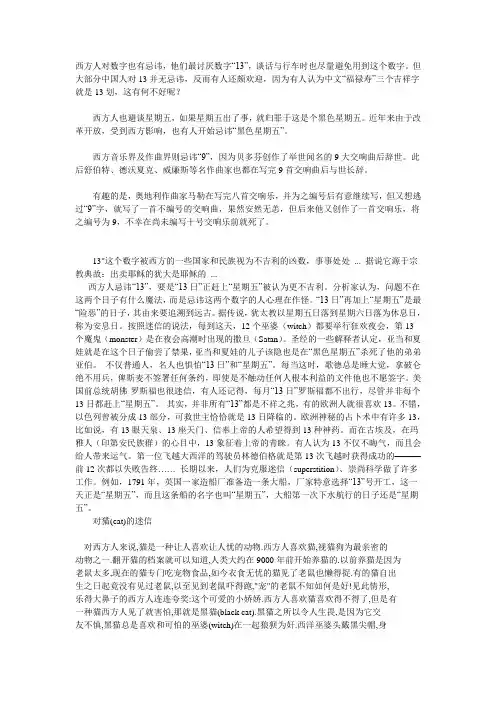
西方人对数字也有忌讳,他们最讨厌数字“13”,谈话与行车时也尽量避免用到这个数字。
但大部分中国人对13并无忌讳,反而有人还颇欢迎,因为有人认为中文“福禄寿”三个吉祥字就是13划,这有何不好呢?西方人也避谈星期五,如果星期五出了事,就归罪于这是个黑色星期五。
近年来由于改革开放,受到西方影响,也有人开始忌讳“黑色星期五”。
西方音乐界及作曲界则忌讳“9”,因为贝多芬创作了举世闻名的9大交响曲后辞世。
此后舒伯特、德沃夏克、威廉斯等名作曲家也都在写完9首交响曲后与世长辞。
有趣的是,奥地利作曲家马勒在写完八首交响乐,并为之编号后有意继续写,但又想逃过“9”字,就写了一首不编号的交响曲,果然安然无恙,但后来他又创作了一首交响乐,将之编号为9,不幸在尚未编写十号交响乐前就死了。
13"这个数字被西方的一些国家和民族视为不吉利的凶数,事事处处... 据说它源于宗教典故:出卖耶稣的犹大是耶稣的...西方人忌讳“13”,要是“13日”正赶上“星期五”被认为更不吉利。
分析家认为,问题不在这两个日子有什么魔法,而是忌讳这两个数字的人心理在作怪。
“13日”再加上“星期五”是最“险恶”的日子,其由来要追溯到远古。
据传说,犹太教以星期五日落到星期六日落为休息日,称为安息日。
按照迷信的说法,每到这天,12个巫婆(witch)都要举行狂欢夜会,第13个魔鬼(monster)是在夜会高潮时出现的撒旦(Satan)。
圣经的一些解释者认定,亚当和夏娃就是在这个日子偷尝了禁果,亚当和夏娃的儿子该隐也是在“黑色星期五”杀死了他的弟弟亚伯。
不仅普通人,名人也惧怕“13日”和“星期五”。
每当这时,歌德总是睡大觉,拿破仑绝不用兵,俾斯麦不签署任何条约,即使是不触动任何人根本利益的文件他也不愿签字。
美国前总统胡佛·罗斯福也很迷信,有人还记得,每月“13日”罗斯福都不出行,尽管并非每个13日都赶上“星期五”。
其实,并非所有“13”都是不祥之兆,有的欧洲人就很喜欢13。
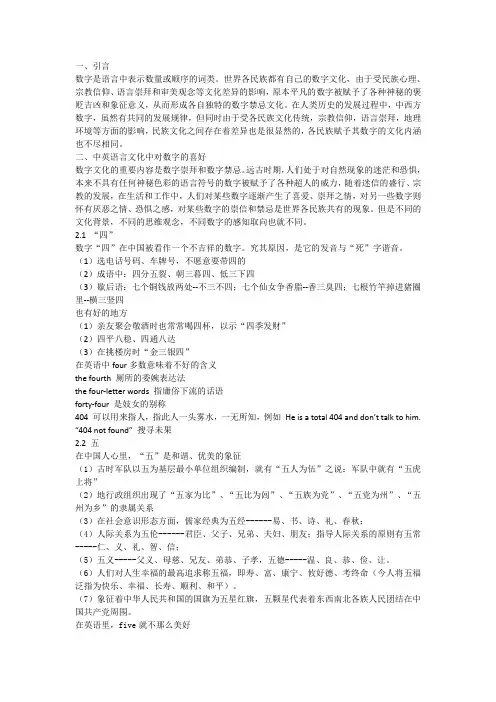
一、引言数字是语言中表示数量或顺序的词类。
世界各民族都有自己的数字文化,由于受民族心理、宗教信仰、语言崇拜和审美观念等文化差异的影响,原本平凡的数字被赋予了各种神秘的褒贬吉凶和象征意义,从而形成各自独特的数字禁忌文化。
在人类历史的发展过程中,中西方数字,虽然有共同的发展规律,但同时由于受各民族文化传统,宗教信仰,语言崇拜,地理环境等方面的影响,民族文化之间存在着差异也是很显然的,各民族赋予其数字的文化内涵也不尽相同。
二、中英语言文化中对数字的喜好数字文化的重要内容是数字崇拜和数字禁忌。
远古时期,人们处于对自然现象的迷茫和恐惧,本来不具有任何神秘色彩的语言符号的数字被赋予了各种超人的威力,随着迷信的盛行、宗教的发展,在生活和工作中,人们对某些数字逐渐产生了喜爱、崇拜之情,对另一些数字则怀有厌恶之情、恐惧之感,对某些数字的崇信和禁忌是世界各民族共有的现象。
但是不同的文化背景,不同的思维观念,不同数字的感知取向也就不同。
2.1 “四”数字“四”在中国被看作一个不吉祥的数字。
究其原因,是它的发音与“死”字谐音。
(1)选电话号码、车牌号,不愿意要带四的(2)成语中:四分五裂、朝三暮四、低三下四(3)歇后语:七个铜钱放两处--不三不四;七个仙女争香脂--香三臭四;七根竹竿掉进猪圈里--横三竖四也有好的地方(1)亲友聚会敬酒时也常常喝四杯,以示“四季发财”(2)四平八稳、四通八达(3)在挑楼房时“金三银四”在英语中four多数意味着不好的含义the fourth 厕所的委婉表达法the four-letter words 指庸俗下流的话语forty-four 是妓女的别称404 可以用来指人,指此人一头雾水,一无所知,例如He is a total 404 and don’t talk to him. “404 not found”搜寻未果2.2 五在中国人心里,“五”是和谐、优美的象征(1)古时军队以五为基层最小单位组织编制,就有“五人为伍”之说:军队中就有“五虎上将”(2)地行政组织出现了“五家为比”、“五比为闾”、“五族为党”、“五党为州”、“五州为乡”的隶属关系(3)在社会意识形态方面,儒家经典为五经------易、书、诗、礼、春秋;(4)人际关系为五伦------君臣、父子、兄弟、夫妇、朋友;指导人际关系的原则有五常-----仁、义、礼、智、信;(5)五义-----父义、母慈、兄友、弟恭、子孝,五德-----温、良、恭、俭、让。
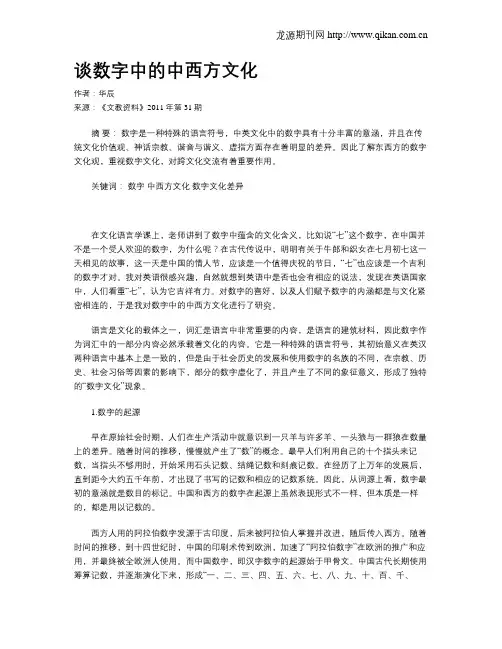
谈数字中的中西方文化作者:华辰来源:《文教资料》2011年第31期摘要:数字是一种特殊的语言符号,中英文化中的数字具有十分丰富的意涵,并且在传统文化价值观、神话宗教、谐音与谐义、虚指方面存在着明显的差异。
因此了解东西方的数字文化观,重视数字文化,对跨文化交流有着重要作用。
关键词:数字中西方文化数字文化差异在文化语言学课上,老师讲到了数字中蕴含的文化含义,比如说“七”这个数字,在中国并不是一个受人欢迎的数字,为什么呢?在古代传说中,明明有关于牛郎和织女在七月初七这一天相见的故事,这一天是中国的情人节,应该是一个值得庆祝的节日,“七”也应该是一个吉利的数字才对。
我对英语很感兴趣,自然就想到英语中是否也会有相应的说法,发现在英语国家中,人们看重“七”,认为它吉祥有力。
对数字的喜好,以及人们赋予数字的内涵都是与文化紧密相连的,于是我对数字中的中西方文化进行了研究。
语言是文化的载体之一,词汇是语言中非常重要的内容,是语言的建筑材料,因此数字作为词汇中的一部分内容必然承载着文化的内容。
它是一种特殊的语言符号,其初始意义在英汉两种语言中基本上是一致的,但是由于社会历史的发展和使用数字的名族的不同,在宗教、历史、社会习俗等因素的影响下,部分的数字虚化了,并且产生了不同的象征意义,形成了独特的“数字文化”现象。
1.数字的起源早在原始社会时期,人们在生产活动中就意识到一只羊与许多羊、一头狼与一群狼在数量上的差异。
随着时间的推移,慢慢就产生了“数”的概念。
最早人们利用自己的十个指头来记数,当指头不够用时,开始采用石头记数、结绳记数和刻痕记数。
在经历了上万年的发展后,直到距今大约五千年前,才出现了书写的记数和相应的记数系统。
因此,从词源上看,数字最初的意涵就是数目的标记。
中国和西方的数字在起源上虽然表现形式不一样,但本质是一样的,都是用以记数的。
西方人用的阿拉伯数字发源于古印度,后来被阿拉伯人掌握并改进,随后传入西方。
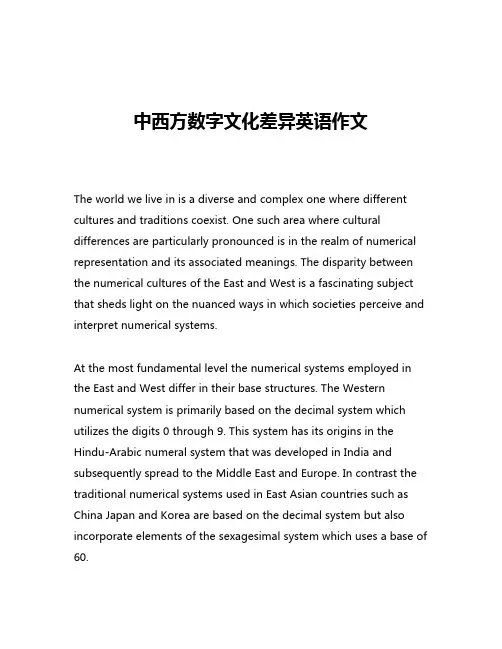
中西方数字文化差异英语作文The world we live in is a diverse and complex one where different cultures and traditions coexist. One such area where cultural differences are particularly pronounced is in the realm of numerical representation and its associated meanings. The disparity between the numerical cultures of the East and West is a fascinating subject that sheds light on the nuanced ways in which societies perceive and interpret numerical systems.At the most fundamental level the numerical systems employed in the East and West differ in their base structures. The Western numerical system is primarily based on the decimal system which utilizes the digits 0 through 9. This system has its origins in the Hindu-Arabic numeral system that was developed in India and subsequently spread to the Middle East and Europe. In contrast the traditional numerical systems used in East Asian countries such as China Japan and Korea are based on the decimal system but also incorporate elements of the sexagesimal system which uses a base of 60.This difference in base structures has led to some interesting divergences in the way numbers are conceptualized and expressed. For instance in the Chinese language individual digits are assigned unique names rather than simply being referred to by their numerical value. The number 4 for example is known as "si" while 7 is "qi". This stands in contrast to the more straightforward numerical naming conventions used in Western languages. Additionally Chinese numerals are written using logographic characters rather than the alphabetic digits employed in the West further emphasizing the distinct visual representation of numbers.The cultural significance assigned to certain numbers also varies greatly between Eastern and Western societies. In the West the number 13 is often viewed with superstition and considered to be unlucky. This belief is so pervasive that many buildings omit a 13th floor and airports lack a Gate 13. In contrast in China the number 4 is widely regarded as unlucky due to its phonetic similarity to the word for "death" in Mandarin. As a result Chinese buildings and product packaging frequently skip the fourth floor or fourth item in a series.Numerical symbolism also manifests in more subtle ways. In Western countries even numbers are often perceived as more balanced and harmonious while odd numbers are seen as less stable. This preference for even numbers can be observed in the layout of buildings the design of consumer products and the organization ofevents. Conversely in East Asian cultures odd numbers are frequently associated with masculinity and vitality while even numbers symbolize femininity and passivity.These divergent attitudes towards numbers extend to their practical applications as well. In the business world for instance Chinese negotiators may place a higher premium on auspicious numbers when making deals. The number 8 for example is considered extremely lucky in China due to its phonetic similarity to the word for "prosperity". As a result Chinese companies may deliberately choose addresses or phone numbers containing multiple 8s. Western business practices on the other hand tend to be more pragmatic and numbers-driven with less emphasis on symbolic significance.Differences in numerical culture can also be seen in the realm of personal names. In the West names are often chosen for their meaning sound or connection to family heritage. Numerical considerations play a relatively minor role. However in China and other East Asian societies the selection of names with favorable numeric associations is extremely important. Parents will carefully choose characters for their children's names that incorporate lucky numbers or avoid unlucky ones. The goal is to endow the individual with positive numeric energy that will bring good fortune and success throughout their life.Ultimately the divergent attitudes towards numbers between Eastern and Western societies stem from deep-rooted cultural traditions and philosophical worldviews. The decimal-based numerical system used in the West reflects a linear and quantitative approach to mathematics and problem-solving. In contrast the incorporation of sexagesimal elements and symbolic number associations in East Asian numerical culture points to a more holistic and qualitative understanding of the role of numbers in the universe.These fundamental differences have profound implications not just for how numbers are perceived and utilized but for the broader mindsets and behaviors that characterize Eastern and Western societies. As the world becomes increasingly interconnected it is crucial to develop a nuanced appreciation for these cross-cultural numerical distinctions. Only then can we navigate the complexities of a globalized world with greater cultural sensitivity and mutual understanding.。

英汉数字的文化差异与翻译财富)、the seven corporal works of mercy(七大肉体善事)、the seven spiritual works of mercy(七大精神善事)、the seven sacraments(七大圣礼)。
此外,人们也视“七”为吉数,在生活中有“lucky seven”的说法,即“幸运之七”。
英语中有“seven”的习语很多,如:Keep a thing seven years and you will find a use for it.(东西保存时间长,终会派上好用场。
) Seven hours’ sleep will make a clown forget his design.(睡七小时的觉,小丑把花样都忘掉。
) A man may lose more in an hour than he can get in seven.(得之艰难失之易) to be in the seventh heaven(极其快乐)等。
(三)、“四”与“十三”1、“四”在中国“四”被视为一个不吉祥的数字,但在古代人们对于“四”并无特别的忌讳。
这主要是因为随着科技的发展,人们生活中越来越多地使用到数字,如门牌号、手机号码、车牌号等。
而因为“4”的发音与“死”谐音,所以车牌号码、电话号码等尾数有四的就不受欢迎。
人们尤其要避开“14”(谐音“要死”)、“514”(谐音“我要死”)、44、444、4444等数目字。
在习语中,数字“四”常常与“三”在一起,常带有贬义。
如:七个铜钱放两处——不三不四;七个仙女争面脂——香三臭四;七根竹竿掉进猪圈里——横三竖四。
虽说在音乐中4的发音与“发”相似,但还是很少有人愿意使用带4的车牌、电话号码等。
不过时下年轻男女很喜欢根据数字的谐音来传递信息。
这种数字信息并不会排斥4,因为4除了可以是“死”的谐音,也可以是“是” 或“世” 等字的谐音。
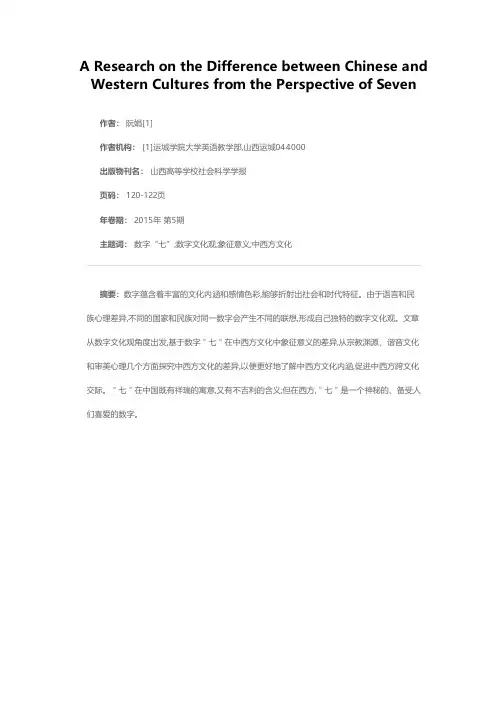
A Research on the Difference between Chinese and Western Cultures from the Perspective of Seven 作者: 阮娟[1]
作者机构: [1]运城学院大学英语教学部,山西运城044000
出版物刊名: 山西高等学校社会科学学报
页码: 120-122页
年卷期: 2015年 第5期
主题词: 数字“七”;数字文化观;象征意义;中西方文化
摘要:数字蕴含着丰富的文化内涵和感情色彩,能够折射出社会和时代特征。
由于语言和民
族心理差异,不同的国家和民族对同一数字会产生不同的联想,形成自己独特的数字文化观。
文章从数字文化观角度出发,基于数字"七"在中西方文化中象征意义的差异,从宗教渊源、谐音文化和审美心理几个方面探究中西方文化的差异,以便更好地了解中西方文化内涵,促进中西方跨文化交际。
"七"在中国既有祥瑞的寓意,又有不吉利的含义;但在西方,"七"是一个神秘的、备受人们喜爱的数字。

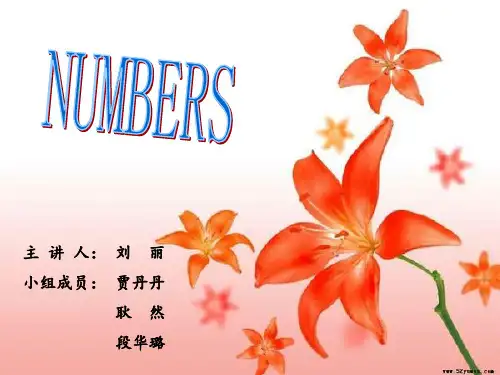
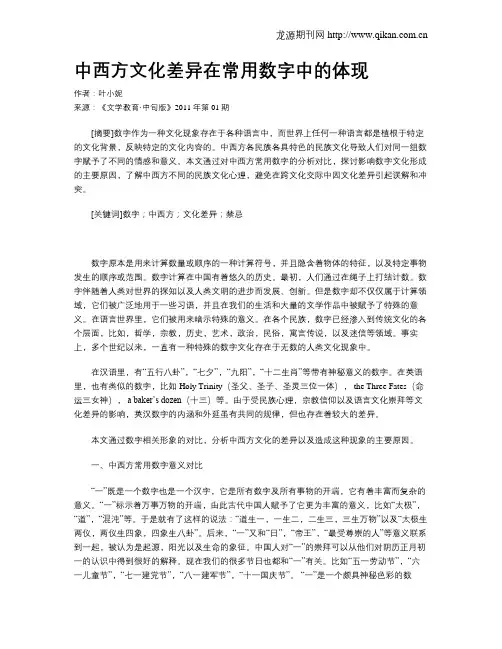
中西方文化差异在常用数字中的体现作者:叶小妮来源:《文学教育·中旬版》2011年第01期[摘要]数字作为一种文化现象存在于各种语言中,而世界上任何一种语言都是植根于特定的文化背景,反映特定的文化内容的。
中西方各民族各具特色的民族文化导致人们对同一组数字赋予了不同的情感和意义。
本文通过对中西方常用数字的分析对比,探讨影响数字文化形成的主要原因,了解中西方不同的民族文化心理,避免在跨文化交际中因文化差异引起误解和冲突。
[关键词]数字;中西方;文化差异;禁忌数字原本是用来计算数量或顺序的一种计算符号,并且隐含着物体的特征,以及特定事物发生的顺序或范围。
数字计算在中国有着悠久的历史。
最初,人们通过在绳子上打结计数。
数字伴随着人类对世界的探知以及人类文明的进步而发展、创新。
但是数字却不仅仅属于计算领域,它们被广泛地用于一些习语,并且在我们的生活和大量的文学作品中被赋予了特殊的意义。
在语言世界里,它们被用来暗示特殊的意义。
在各个民族,数字已经渗入到传统文化的各个层面,比如,哲学,宗教,历史,艺术,政治,民俗,寓言传说,以及迷信等领域。
事实上,多个世纪以来,一直有一种特殊的数字文化存在于无数的人类文化现象中。
在汉语里,有“五行八卦”,“七夕”,“九阳”,“十二生肖”等带有神秘意义的数字。
在英语里,也有类似的数字,比如 Holy Trinity(圣父、圣子、圣灵三位一体), the Three Fates(命运三女神),a baker’s dozen(十三)等。
由于受民族心理,宗教信仰以及语言文化崇拜等文化差异的影响,英汉数字的内涵和外延虽有共同的规律,但也存在着较大的差异。
本文通过数字相关形象的对比,分析中西方文化的差异以及造成这种现象的主要原因。
一、中西方常用数字意义对比“一”既是一个数字也是一个汉字,它是所有数字及所有事物的开端,它有着丰富而复杂的意义。
“一”标示着万事万物的开端,由此古代中国人赋予了它更为丰富的意义,比如“太极”,“道”,“混沌”等。
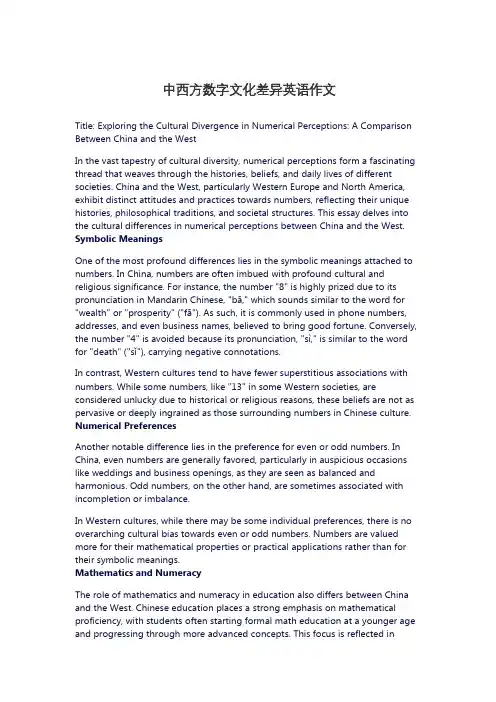
中西方数字文化差异英语作文Title: Exploring the Cultural Divergence in Numerical Perceptions: A Comparison Between China and the WestIn the vast tapestry of cultural diversity, numerical perceptions form a fascinating thread that weaves through the histories, beliefs, and daily lives of different societies. China and the West, particularly Western Europe and North America, exhibit distinct attitudes and practices towards numbers, reflecting their unique histories, philosophical traditions, and societal structures. This essay delves into the cultural differences in numerical perceptions between China and the West. Symbolic MeaningsOne of the most profound differences lies in the symbolic meanings attached to numbers. In China, numbers are often imbued with profound cultural and religious significance. For instance, the number "8" is highly prized due to its pronunciation in Mandarin Chinese, "bā," which sounds similar to the word for "wealth" or "prosperity" ("fā"). As such, it is commonly used in phone numbers, addresses, and even business names, believed to bring good fortune. Conversely, the number "4" is avoided because its pronunciation, "sì," is similar to the word for "death" ("sǐ"), carrying negative connotations.In contrast, Western cultures tend to have fewer superstitious associations with numbers. While some numbers, like "13" in some Western societies, are considered unlucky due to historical or religious reasons, these beliefs are not as pervasive or deeply ingrained as those surrounding numbers in Chinese culture. Numerical PreferencesAnother notable difference lies in the preference for even or odd numbers. In China, even numbers are generally favored, particularly in auspicious occasions like weddings and business openings, as they are seen as balanced and harmonious. Odd numbers, on the other hand, are sometimes associated with incompletion or imbalance.In Western cultures, while there may be some individual preferences, there is no overarching cultural bias towards even or odd numbers. Numbers are valued more for their mathematical properties or practical applications rather than for their symbolic meanings.Mathematics and NumeracyThe role of mathematics and numeracy in education also differs between China and the West. Chinese education places a strong emphasis on mathematical proficiency, with students often starting formal math education at a younger age and progressing through more advanced concepts. This focus is reflected inChina's international standing in mathematical competitions and its reputation for producing highly skilled mathematicians and engineers.In Western countries, while mathematics remains an essential part of the curriculum, the emphasis is often more balanced with other subjects. Students are encouraged to develop a broad range of skills and interests, and mathematical education tends to be more practical and application-oriented.ConclusionIn conclusion, the cultural differences in numerical perceptions between China and the West are multifaceted, reflecting the unique histories, beliefs, and societal structures of each region. From the symbolic meanings attached to numbers to the preferences for even or odd numbers, and the differing roles of mathematics in education, these differences offer a fascinating glimpse into the diverse ways in which humans interact with and interpret the numerical world. As globalization continues to bring people from different cultures closer together, understanding and respecting these differences becomes increasingly important in fostering cross-cultural understanding and harmony.。
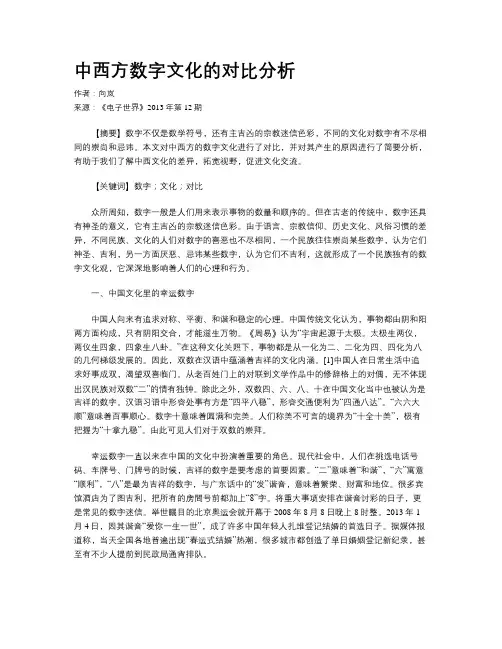
中西方数字文化的对比分析 作者:向岚 来源:《电子世界》2013年第12期
【摘要】数字不仅是数学符号,还有主吉凶的宗教迷信色彩,不同的文化对数字有不尽相同的崇尚和忌讳。本文对中西方的数字文化进行了对比,并对其产生的原因进行了简要分析,有助于我们了解中西文化的差异,拓宽视野,促进文化交流。
【关键词】数字;文化;对比 众所周知,数字一般是人们用来表示事物的数量和顺序的。但在古老的传统中,数字还具有神圣的意义,它有主吉凶的宗教迷信色彩。由于语言、宗教信仰、历史文化、风俗习惯的差异,不同民族、文化的人们对数字的喜恶也不尽相同,一个民族往往崇尚某些数字,认为它们神圣、吉利,另一方面厌恶、忌讳某些数字,认为它们不吉利,这就形成了一个民族独有的数字文化观,它深深地影响着人们的心理和行为。
一、中国文化里的幸运数字 中国人向来有追求对称、平衡、和谐和稳定的心理。中国传统文化认为,事物都由阴和阳两方面构成,只有阴阳交合,才能滋生万物。《周易》认为“宇宙起源于太极。太极生两仪,两仪生四象,四象生八卦。”在这种文化关照下,事物都是从一化为二、二化为四、四化为八的几何梯级发展的。因此,双数在汉语中蕴涵着吉祥的文化内涵。[1]中国人在日常生活中追求好事成双,渴望双喜临门。从老百姓门上的对联到文学作品中的修辞格上的对偶,无不体现出汉民族对双数“二”的情有独钟。除此之外,双数四、六、八、十在中国文化当中也被认为是吉祥的数字。汉语习语中形容处事有方是“四平八稳”,形容交通便利为“四通八达”。“六六大顺”意味着百事顺心。数字十意味着圆满和完美。人们称美不可言的境界为“十全十美”,极有把握为“十拿九稳”。由此可见人们对于双数的崇拜。
幸运数字一直以来在中国的文化中扮演着重要的角色。现代社会中,人们在挑选电话号码、车牌号、门牌号的时候,吉祥的数字是要考虑的首要因素。“二”意味着“和谐”,“六”寓意“顺利”,“八”是最为吉祥的数字,与广东话中的“发”谐音,意味着繁荣、财富和地位。很多宾馆酒店为了图吉利,把所有的房間号前都加上“8”字。将重大事项安排在谐音讨彩的日子,更是常见的数字迷信。举世瞩目的北京奥运会就开幕于2008年8月8日晚上8时整。2013年1月4日,因其谐音“爱你一生一世”,成了许多中国年轻人扎堆登记结婚的首选日子。据媒体报道称,当天全国各地普遍出现“春运式结婚”热潮,很多城市都创造了单日婚姻登记新纪录,甚至有不少人提前到民政局通宵排队。 除了双数以外,“九”也是富有神秘色彩的数字。汉语中有很多带“九”的习语,如“九霄云外”、“九牛一毛”、“九死一生”、“九牛二虎之力”、“一言九鼎”、“一龙生九子,九子各不同”等。在中国文化里“九”被认为是数之极,由此引出“无限”之说,既而演化出“神圣”之意。中国帝王都把自己同“九”联系在一起,称自己为“九五之尊”。如天分为九重,即言其高;天庭日为九月初九,天子祭天一年九次;皇宫殿宇的建筑也与“九”有关。如“九龙壁”,北京城有九门,天安门城楼面阔九间,紫禁城房间有九千九百九十九间,宫内三大殿的高度都是九尺九,宫殿和大小城门上金黄色的门钉都是横九排,竖九排,共计九九八十一个,宫殿的台阶都是九级或九的倍数。在民间,人们也将含“九”的日期为结婚吉日,与“久”谐音,寓意天长地久。
中英数字文化差异摘要:数字是人类语言文化的一个特殊领域。
数字本来是一种计算符号,但不同的民族赋予了数字特殊的涵义,使数字蒙上了神秘的文化色彩。
对比分析中英民族对数字的文化感知,有助于我们了解数字隐含的民族文化心理、宗教信仰以及深刻的民族的哲学思想等文化差异,更好地进行跨文化交际。
关键词:数字;文化差异;禁忌Abstract:Numbers constitute a special aspect in human language and culture. Numbers are originally the signs for calculating, but they have different connotations under different cultures. The symbolic meanings make the numbers not only mysterious but culturally unique. The comparison between the Chinese and English reflections of the numbers can help us to know the differences in such respects as the psychology, religion and philosophy. Therefore, we can communicate with the English-speaker well.Key words:numbers;culture differences;taboo一、引言数字是语言中表示数量或顺序的词类。
世界各民族都有自己的数字文化,由于受民族心理、宗教信仰、语言崇拜和审美观念等文化差异的影响,原本平凡的数字被赋予了各种神秘的褒贬吉凶和象征意义,从而形成各自独特的数字禁忌文化。
在人类历史的发展过程中,中西方数字,虽然有共同的发展规律,但同时由于受各民族文化传统,宗教信抑,语言崇拜,地理环境等方面的影响,民族文化之间存在着差异也是很显然的,各民族赎予其数字的文化内涵也不尽相同。
中西方文化之数字班级:10级专一班学号:102831024 姓名:舒曼摘要:本文以“9”和“7”为例,以中西方文化差异为理论基础,分析了由于文化背景和宗教信仰的差异而导致数字文化差异。
关键字:九七共性特性一、引言:数字是人类思维发展到一定阶段,为适应社会生产活动的需要,在符号的帮助下产生的。
"(苏金智,1991),在科学的数字世界里,它的功能是计算,职司分明,是实数;而在人类心灵的数字世界中,它的功能是表义,许多数字经过“神化”后成为“虚数”。
它们有着极其丰富的外延和内涵。
"(王秉钦,1998)由于受东西方文化传统、宗教信仰、等方面的影响,数字的神化存在着东西方的差异,但也存在着共性。
东方人有自己心目中的"天数9",而西方人也有自己心目中的"神数7"。
神秘数字的演化规律一般经过"神化—泛化—虚化"的过程。
(王秉钦,1998)二、东西方数字"九"和“七”的文化对比分析在我国,人们之所以把"九"看成是自己心目中的"天数"和最富有神奇色彩的数字,是因为"九" 这个数字的象征意义(symbol meaning),在我国可以说历时最优久。
"九"作为数不同于一般数字,在中国古代被认为是一种神秘的数字,它起初是龙形图腾化之文字,继而演化出"神圣" 之意,于是中国古代历代帝王为了表示自己神圣的权力为天赐神赋,便竭力把自己同“九”联系在一起。
如天分九层,天子祭天一年九次。
汉语词汇中也常用"九"来形容帝王将相的称谓,如"九五之尊"(imperial throne);称官位仅次于皇帝的王爷为"九千岁 "等。
对西方人来说, "九"的象征意义是"神性"、 "神圣之至"。
英汉数字文化差异及翻译社会生活中,科教文卫经济等方方面面都会涉及到数字,所以只要有人类居住的地方就有数字的出现,“认知是语言的基础,语言是认知的窗口”。
在各个民族的文化中,数字都绝不仅仅只有本身的计数计算功能,还是具有非数字意义的文化符号。
英汉民族的数字文化,产生于两种不同的文化和社会背景之中,存在差异是必然的。
因此我们要做的就是深入了解英汉数字文化之间的差异,这也有助于我们在不断发展进步的对外交流中做到相互尊重,减少误会与摩擦,更好的将中国文化推向世界。
一、中西方数字文化差异英汉两个民族英汉民族由于长久以来所处的不同地理位置,不同生活方式而形成各具特点的数字文化,因此,对数字的偏好、忌讳等存在许多异同。
在汉语中,人们最喜欢的数字就是“六”和“八”,“六六大顺”的寓意十分令人喜欢,此外,“八”因为谐音“发”也深受大家喜欢。
但有一个词语“二百五”,形容一个人鲁莽、没有头脑,所以常被用来骂人。
而西方世界主流信仰为基督教,基督教主张圣父、圣子、圣靈三位一体。
因此西方人偏爱“三”,把“三”看作吉祥的数字。
同时,因为耶稣死在“13”号这一天,所以西方人对13这个数字特别忌讳,甚至会直接避开这个数字。
二、翻译方法严复先生倡导的翻译三原则“信、达、雅”,傅雷先生也提出过的“重神似不重形似”,在翻译研究的进程中,虽然中西方翻译家们所研究的侧重点不同,但其实主要意思都是说:“译文要准确地表达原文的意义,保持原作的风格,忠实翻译原作的面貌”。
在面对数字的翻译时,我们也同样要采取各种适合的方式技巧,做到忠实,传神。
(一)直译每个民族的文化都有一定的共通之处。
英汉数字中有一些意义近似的词语,隐含意义基本相同,也就是说,在翻译这些相似性的表达时,我们一般选择保留数字进行直译。
例如:a drop in the ocean沧海一粟A fall into the pit,a gain in your wit.吃一堑,长一智A cat has nine lives.猫有九命(二)意译由于每个民族的数字具有都有其民族的独特表达和使用方法,因此我们进行翻译时,如过原样照搬,翻译出来的效果可能不会尽如人意,因此,有时须意译。
中西方古代数学文化比较国营13-4班向越嘉摘要:中西方数学各有其独特的历史成就、文化历程。
中国古代数学在文化传统中的价值取向就是在筹算运演机械重复的条件下尽力构造简明的运演方法,准确迅速地解决实践提出的具体问题;西方对于数学的认识不在于得出结论,而是在于如何去证实这个结论,或者说就是完全已经脱离实用目的,是以秀智商为基本诉求的一种智力竞赛。
对世界数学的发展都有其重要贡献,各有其优缺点,不存在孰优孰劣。
关键词:数学科学、西方数学、中西方数学文化、毕达哥斯拉学派、筹算一、中西方数学文化差异的背景谈起数学,我们这一代人都不会陌生,因为我们当中的绝大多数人,花了人生中的十二年时光,六年小学和六年中学,有幸的还要加上一年大学的高等数学,可以说是饱受数学的摧残,但是我们却只知道数学是敲开大学校门的一块敲门砖,甚至把数学这个东西当做是我们人生中最痛苦的经验,屡屡在或抱怨或呐喊着,“删了这个东西好不好”,“数学滚出高考好不好”之类的话。
殊不知,若当你有心去深入数学这个领域,了解数学背后的故事、历史,你会惊讶的发现到,数学这个东西的魅力是如此的光芒万丈,它吸引了无数的智力卓绝的人,为了去构建它,了解它,捍卫它而做出多少奉献,花费多少精力,甚至于献祭出多少生命,关于数学背后的文化历史是多么的波澜壮阔。
数学科学作为以人们的社会生活需要及客观现象为研究对象,必然成为了人类文明的一个组成部分,和一定的社会历史发展水平相适应;而数学作为一种文化现象,早已是人们的常识。
每个民族都有自己的文化,也就一定有属于这个文化的数学。
古代西方的数学和中国传统数学都有辉煌的成就、优秀的传统。
但是,它们之间有着明显的差异。
古代西方和古代中国的不同政治文明孕育了不同的数学。
在西方,小亚西亚海岸新兴的商业城市、希腊本土、西西里岛和意大利海滨,由于海上贸易和战争的刺激使得人们的思想活跃,商品贸易发达,对计算要求的提高,财富的增加使人们有更多的时间从事“非实用”的理论研究。
英语专业全英原创毕业论文,是近期写作,公布的题目可以用于免费参考 最新英语专业全英原创毕业论文,都是近期写作 1 中小学英语词汇教学法探讨 2 象征主义手法在《白鲸》中的运用 3 探究傲慢与偏见的独特魅力 4 索尔贝娄的《银碟》中父子关系的分析 5 组织学习障碍及相应的对策 6 爱米丽的挣扎与终结——论《献给爱米丽的一朵玫瑰花》中爱米丽毁灭的间接和直接原因 7 影响英语阅读理解效率的非语言因素 8 影响大学生英语自主学习的因素研究 9 从《喜福会》看美国华裔女作家身份探求 10 目的论在电影字幕翻译中的应用——以《功夫熊猫》为例 11 英汉颜色词的认知语义分析—以红色、黄色为例 12 浅析《恋爱中的女人》中劳伦斯的爱情观 13 功能对等理论视角下英语言语幽默的翻译—以《老友记》为例 14 日用品广告语言中中西方价值观差异比较研究 15 《紫色》中黑人女性意识的觉醒和成长 16 从功能派翻译理论的角度研究中国菜单翻译 17 文化与幽默欣赏 18 从女性主义角度看《觉醒》中爱德娜的女性主体意识觉醒 19 试论英语学习中的动机 20 艾米莉•狄金森诗歌中的动物意象研究 21 从生态视角解读《瓦尔登湖》 22 The Essence of Democracy and Freedom: An Interpretation of the Animal Farm 23 从文本类型角度看企业外宣材料的翻译 24 男权社会下康妮女性身份的诉求--D.H.劳伦斯《查泰莱夫人的情人》的研究 25 霍桑的《胎记》中乔治亚娜的死的深层原因探究 26 从尤金•奈达的功能对等理论角度论网络流行语的可译与不可译 27 从生态批评角度解析杰克•伦敦的动物小说《野性的呼唤》和《白獠牙》 28 家庭生活中的瑞普凡温克尔 29 艾米莉狄金森诗歌中的动物意象研究 30 Study of the Translation of Flower Image in Chinese Classical Poetry 31 浅析中文商标词英译的原则和方法 32 浅析美国慈善捐赠的文化动因(开题报告+论) 33 朱虹翻译作品中的女性主义意识研究 34 《格列佛游记》对理性的反思与批判 35 Roads to Happy Marriage: a New Conception of Feminism in Doris Lessing’s Novels 36 英语习语的文化内涵 37 全身反应教学法在儿童英语教学中的运用 38 从《野性的呼唤》看杰克・伦敦的人生观 39 论“成长的烦恼”中的美国家庭文化 40 从《到灯塔去》中莉丽•布里斯科的性格发展看维吉妮亚•伍尔夫的双性同体理论 41 《老人与海》象征主义探究 英语专业全英原创毕业论文,是近期写作,公布的题目可以用于免费参考 42 商务英语中的颜色词浅析 43 从功能翻译理论的角度论中文菜单的英译 44 由英语外来词谈中英文化 45 A Comparative Study of Inversion between English and Chinese 46 汉语被动句的英译 47 情感在英语教学中的作用及其实施 48 论新闻英语中的选词及其翻译 49 论如何提高初中英语课堂教学效率 50 从美国妇女社会地位的提升看英语歧视性词汇的变化 51 合作原则在动画中的应用 52 浅析英汉词汇中的性别歧视现象及其成因 53 The Developments of Marriage View over Three Periods in the West 54 中式菜名的英译 55 The Unique Characteristics of Edgar Allen Poe’s Gothic Stories 56 现代人对超人的需求--超人形象演变综述 57 《呼啸山庄》的悲剧分析 58 Characteristics of English Slang and Their Social Functions 59 中国皮钦语的产生和发展 60 对《驯悍记》中泼妇凯萨琳娜的简略分析 61 中西思维差异对商务谈判的影响 62 63 从奈达的动态对等理论比较研究《德伯家的苔丝》的两个中文译本 64 A Magic World: A Study of Magic Agents in Harry Potter 65 英汉“拉”类动词的语义成分和词化模式的对比分析 66 本我,自我,超我--《名利场》中利蓓加的形象分析 67 A Contrastive Study on Language Features of Chinese and English Proverbs 68 “红”、“黄”汉英联想意义对比研究 69 基于关联理论的名动转换词语义认知研究 70 论《呼啸山庄》中两代人之间不同的爱情观 71 A Probe Into the Translation of the Hot Cyber Word—“Geili” 72 中学英语口语互动教学的现状及存在的问题 73 论建构主义理论指导下英语口语教学方法 74 试论旅游文本英译策略 75 The Analysis of Narrative Techniques in William Faulkner’s “A Rose for Emily” 76 从《无名的裘德》看哈代的现代性意识 77 女权主义评论视角下的《金色笔记本》 78 《威尼斯商人》中夏洛克与《失乐园》中的撒旦的反叛者形象比较 79 Beauty in Sense, Sound and Form-An Analysis of Two Chinese Versions of A Red, Red Rose 80 宋词英译中的模因传播分析 81 中西面子观比较研究 82 从就餐细节看中美儿童个性能力的差异 83 王尔德童话《快乐王子》中的对比艺术 84 Maternal Love in The Millstone 85 “黑尔舍姆”教育尝试的失败—析石黑一雄小说《别让我走》(开题报告+论) 英语专业全英原创毕业论文,是近期写作,公布的题目可以用于免费参考 86 “红”的中英对比及其翻译 87 从语用角度探讨汉译英公示语 88 论《格列佛游记》中的讽刺 89 语用合作原则及礼貌原则在商业广告中的有效运用 90 浅议《女勇士》中的个人英雄主义 91 从词汇对等角度看《红楼梦》中“笑”一词的英译 92 从功能对等角度看信用证英语的翻译 93 英语非作格动词语义特征和句法属性研究 94 中英颜色词及象征意义 95 《汤姆叔叔的小屋》中圣克莱尔一家的人物分析 96 初中生单词记忆的可行性研究 97 The Racial Stereotypes in American TV Media 98 论小学英语教学中的词汇教学策略 99 Difference between Chinese Buddhism and American Christianity 100 浅析《德伯维尔家的苔丝》中造成苔丝悲剧的因素 101 《愤怒的葡萄》中的圣经原型 102 嘉莉妹妹失去自我的悲剧性命运对中国女性自我价值体现的启迪 103 《等待野蛮人》中的寓言式写作手法 104 中英手机短信的修辞特点分析 105 环保宣传语翻译中的文化介入 106 A Withering Rose:An Analysis of Tess’s Tragedy 107 哈代的悲观主义和宿命论在《德伯家的苔丝》中的体现 108 The Application of Cooperative Learning in Senior High School English Writing Class 109 英文电影字幕翻译的原则和技巧 110 女性哥特视角下的《蝴蝶梦》 111 The Loneliness in Far From the Madding Crowd 112 从功能对等的理论看英语歌词的翻译 113 从旅游看中美核心文化差异 114 论英语新课标下高中生跨文化意识的培养 115 从《简爱》看夏洛蒂•勃朗特的女性意识 116 《傲慢与偏见》和《简爱》中的性别歧视现象和女权主义 117 比较《基督山伯爵》和《连城诀》复仇的异同 118 从约翰邓恩的“奇思妙喻”中透视他矛盾的情感观 119 从接受美学视角看中式菜肴的英译 120 Risk Comparing of Documentary Collection and Letters of Credit 121 浅析哈代的悲观主义哲学对徐志摩诗歌创作之影响 122 从Salsa舞解析墨西哥人的性格 123 哈金小说《等待》中的女性悲剧分析 124 浅析简•爱的反抗性格及其形成过程 125 语境策略在词汇学习中的有效性 126 析《小妇人》中的超验主义 127 论《蝇王》中戈尔丁对人性之恶的解析 128 对《红字》中丁梅斯代尔的心理分析 129 试论英汉日常礼貌表达的异同 英语专业全英原创毕业论文,是近期写作,公布的题目可以用于免费参考 130 从英汉颜色词的内涵看其翻译 131 对非英语专业大学生英语自主学习能力的调查 132 Translation Strategy on Culturally-loaded Expressions in Prison Break 133 On the Principle of Elegance in the Translation of Business Contracts 134 [政治学与行政学]行政忠诚:困境与重塑 135 从《喜福会》看美国华裔女作家身份探求 136 通过《喧哗与骚动》中三兄弟各自对于凯蒂的叙述分析三人各自性格特征 137 书面语言输入与输出对英语词汇习得的影响 138 从电影《弱点》看美国的家庭教育 139 析《苔丝》中的象征意义 140 Sino-US Cultural Differences——Through Comparison Between APPLE and OPPO 141 从新闻用语特点对比中西方文化差异 142 对《草叶集》两个汉译本的比较研究 143 解析电影《黑暗骑士》中的美国个人英雄主义 144 英语专业学生词汇学习策略特点研究 145 对外汉语教学中的成语研究 146 女性主义翻译理论在《傲慢与偏见》翻译中的体现 147 从女权主义视角分析《德伯家的苔丝》 148 文化差异对中美商务谈判的影响 149 英雄的成长-对《指环王》主人公弗罗多的分析 150 Contrariety of William Blake--Image Analysis of Songs of Innocence and of Experience 151 合作性学习在教学中的作用 152 地理环境影响下的中英谚语差异 153 汉语中英语借词及其语言文化影响 154 爱与正义:《杀死一只知更鸟》主人公阿提克斯•芬奇形象解读 155 156 中学英语老师提问存在的问题及解决策略 157 Roberta’s Role in An American Tragedy 158 麦都思眼中的中国宗教形象 159 嘉莉妹妹三个梦的心理需求分析 160 On Chinese-English Translation of Public Signs: Problems and Suggested Solutions 161 狄更斯小说《远大前程》中的批判现实主义特点解读 162 《红字》中霍桑的女性观 163 《月下独酌》两种英文译本之对比研究 164 A Study on the Methods of Movie Title Translation 165 论华兹华斯诗歌中的自然观 166 论矛盾修辞法在英语广告中的语用功能 167 《高级英语》中某些修辞手法赏析 168 Pragmatic Failures in Translation of C-E Advertisements 169 初中生英语学习内在动机的激发 170 The Use of Body Language in Teaching 171 Using Maslow’s Hierarchy Needs Theory to Analyze Sister Carrie’s Destiny 172 《德伯家的苔丝》中苔丝之死的必然性 173 浅析《藻海无边》中安托瓦内特的悲剧